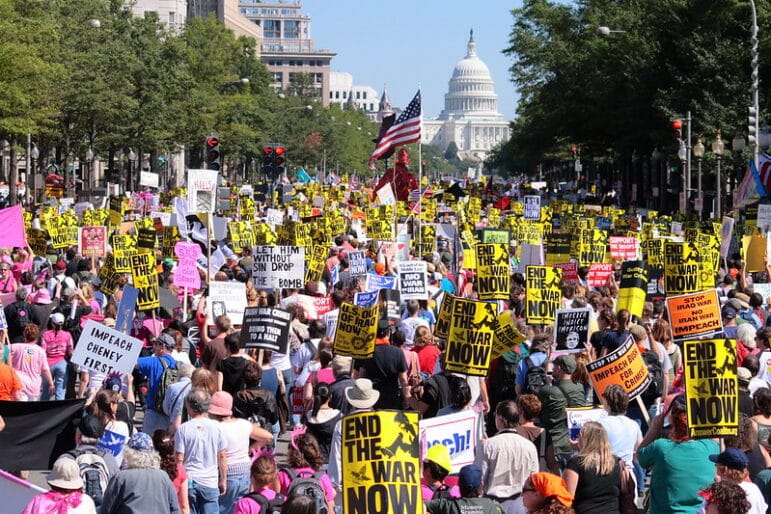Background
The PCJF waged a decade-long battle to strike down the District of Columbia’s unconstitutional regulations on postering winning a string of victories in the lower court which forced the District to repeatedly rewrite its unlawful regulations. The final iterations were upheld by the D.C. Circuit despite the PCJF’s continued objection to remaining rules that determined how posters were regulated based on the content of the words.
The case was fought up to the Supreme Court, where, working with Paul Hughes, PCJF filed a Petition for Writ of Certiorari, which was ultimately denied.
The regulations had previously been used to target grassroots organizations posting political messages in the nation’s capital and were unconstitutionally vague, granting standardless discretion to enforcement agents who could issue draconian fines of up to $2,000 per poster.
The PCJF mounted this legal challenge in federal court in 2007, after D.C. issued hundreds of baseless citations and $70,000 in fines to the anti-war organization, Act Now to Stop War & End Racism Coalition (ANSWER). The litigation continued on behalf of ANSWER and the Muslim American Society Freedom Foundation (MASF), a civil rights and social justice organization.
In response to the PCJF’s legal challenge, the District amended its regulations four times until the final regulations were struck down by a federal district court. In 2012, then Chief Judge of the U.S. District Court for the District of Columbia Royce Lamberth issued a 58-page opinion ruling that the challenged law “fails First Amendment and Due Process scrutiny.”
Separately the PCJF forced the District to rescind the $70,000 in potentially bankrupting fines it falsely issued after years of prosecution.
In 2017, the U.S. Court of Appeals for the D.C. Circuit reinstated the last iteration of the challenged regulations.
The ordinance provides no objective criteria to govern enforcement agents’ discretion in issuing fines as they may choose to deem a poster to be related to an event and thus subject to special restrictions requiring early removal and massive fines – even where no event is referenced on the face of the leaflet.
In his 58-page opinion, now reversed on appeal, Judge Lamberth wrote: “When First Amendment rights are at issue, the government must strive to be clear and precise. It should cabin discretion to ensure that its law is enforced fairly and predictably. It cannot simply allow each officer to independently decide whether certain speech runs afoul of the law.”
The ruling continued, “[O]nce the District opens up public property to political speech, it has a responsibility to be fair, even, and precise in its regulations. If it chooses to make distinctions between different types of speech—even if its distinctions might appear benign—it must justify why it treats different kinds of speech differently, and explain how this distinction furthers its significant interests. When treading on First Amendment interests, it should strive to limit administrative discretion, not codify and endorse it. In order to avoid chilling protected speech, the regulations must be clear, and provide objective standards for enforcement.”
Legal Information
Act Now to Stop War and End Racism, et al v. District of Columbia, United States District Court for the District of Columbia | Case No. 1:07-cv-01495-RCL
United States Court of Appeals for the District of Columbia | Case No. 12-7139
MASF vs. DC Petition for Certiorari
Cross-Appellants’ Responsive Supplemental Brief Addressing Reed
Cross-Appellants’ Supplemental Brief Addressing the Impact of Reed
Order denying defense’s Motion for Summary Judgment, granting in part plaintiffs’ motion
PCJF News
The Fight to Strike Down Unconstitutional Regulations on Postering
D.C. gov’t rescinds unconstitutional postering rule
Judge will allow First Amendment challenge to rules governing political posters in Washington
Federal Court Ruling on Constitutional Challenge to Postering Regulations in Washington, D.C.
D.C. lamppost sign regulations may be unconstitutional, judge says
Press Coverage
The Washington Post – Judge finds District’s rules for hanging political posters unconstitutional
U.S. District Chief Judge Royce C. Lamberth’s ruling finds that the city’s rules governing how long signs can be posted violate the First Amendment and prevents the District from enforcing the regulations.
Legal Times – Federal Judge Slams D.C. Lawyers for ‘Orwellian’ Worldview
Page Photo Credit “Marching to The Capitol,” by Sage Ross CC BY-SA 2.0 DEED

